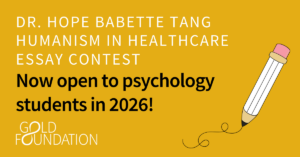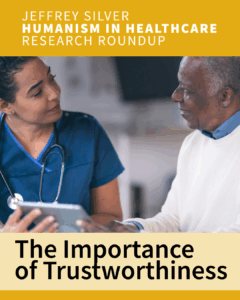This post is part of our collection of “Gold Nuggets” — our way of alerting the medical community to original artwork, poetry or multimedia that stimulate discussion and reflection.
In a blog post titled “Toward the clinical humanities: How literature and the arts can help shape humanism and professionalism in medical education“, Johanna Shapiro, PhD writes “I have never found a better way of encouraging students to ask questions and of stimulating a critical position in regards to the answers that emerge, than by having them read a poem or participate in a skit or gaze at a painting.”
If you have something you think would make for good discussion by the medical community, you can submit a Gold Nugget by following these instructions.
A Poem for Gold
A humanistic physician lives with intention
Walks a mile for his or her patient
Has ears that never quit and listens with patience and endurance
Learns how to analyze, prep, and prepare for those she cares for and comforts
Has no regret for the time he spends for those that need
A humanistic physician knows how to laugh, yet pursues wellness
He or she must continue to learn and yet appreciates the gift they possess
So my fellow students of Humanism, do all you can in the spirit of education
Please with the spirit of love, humble those you care for with passion and vigor
Let them feel that they are not alone and with your spirit and professional guidance victory will be
It is good to be, reflect, embrace, collaborate, energetic, strive for Humanism —-
It is after all great medicine!
-Eric Ayers, MD
Discussion Questions
1. Is Humanism innate, or can it be taught or learned?
2. Can a Humanistic physician cross cultural boundaries better than a nontraditional physician in relation to spirituality, holistic medicine, and cultural related issues that may involve touch and the exam itself?
3. Is the desire to practice humanistic medicine natural and not driven via economics? Influenced by socio-economic factors? Is the practice of Humanistic medicine more prevalent in urban versus suburban versus rural areas?
4. How would you critique yourself as a humanistic physician, with the rating scale being great, good, adequate, or poor? Why do you think you deserve this rating?


